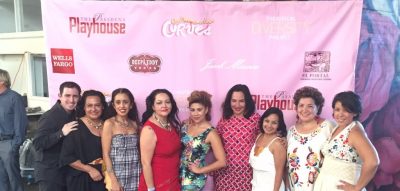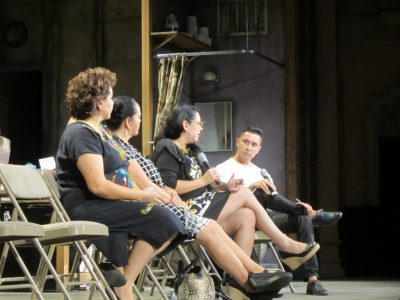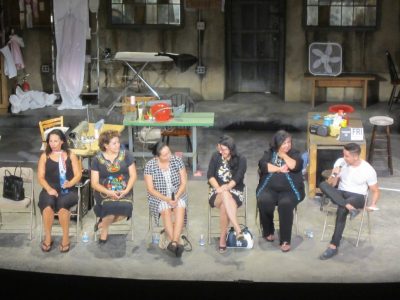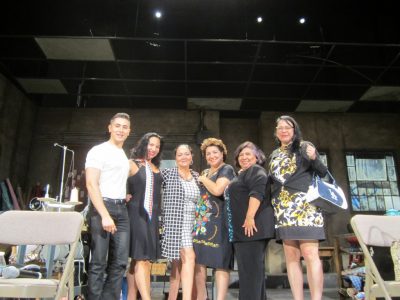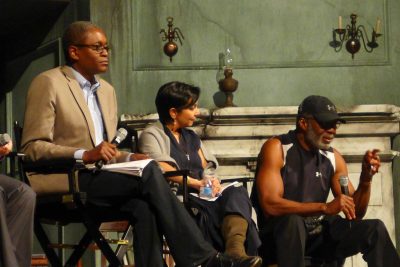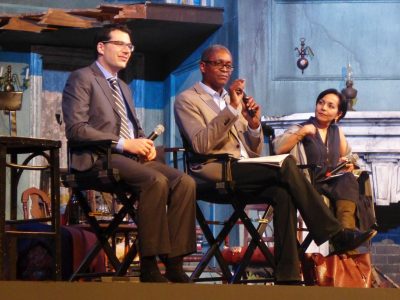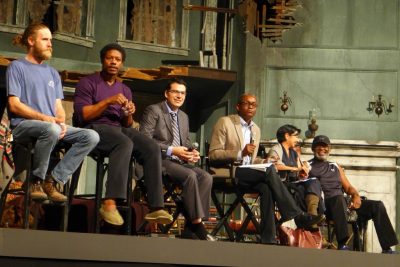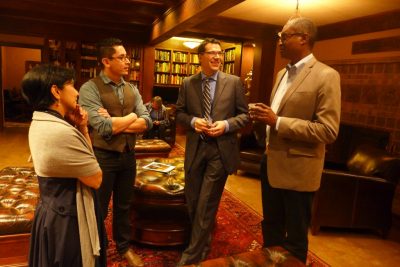Policy at the Playhouse
Policy at the Playhouse started as a creative project in 2015. USC Bedrosian Center recognized that conversations about governance take place in many different fora and are voiced by many different communities. The project has grown over the years and is now a partnership between the USC Sol Price School of Public Policy (programmatic leadership from USC Bedrosian) and the USC School of Dramatic Arts.
Beginning in 2017, in addition to the performance talkbacks, we discuss the plays further on the Policy at the Playhouse podcast
Recently
In this episode, Marlene Forte, Aubrey Hicks, Oliver Mayer, and John Sonego take a look at one of the more influential Spanish playwrights of the early 20th century: Federico García Lorca. We discuss theatre and politics, the staying power of Lorca’s work, and a new adaptation of Yerma coming to LA theatre near you. Listen to a conversation about Latinas and the strength of female characters, sexuality, the politics of theatre, and why you should put your phone down and go see Yerma in the Desert today.
Urban Theatre Movement in Residency at Greenway Court Theatre presents:
Yerma in the Desert
11/17 – 12/16
By Oliver Mayer
Based on YERMA by Federico García Lorca
Directed by Edgar Landa & Marlene Forte
For the second season of the Policy at the Playhouse podcast, we’re switching things up. Rather than addressing one performance of one play, we’ll be looking at the larger themes in theatre as it can pertain to our civic lives. This episode will look at how two plays being performed here on campus this Fall: Passion Play by Sarah Ruhl, and Circle Mirror Transformation by Annie Baker.
In this episode, Aubrey Hicks, Oliver Mayer, Christopher Shaw, and John Sonego examine “how, over time, the rituals that we enact color, reflect, refract back upon who we are, at any time – politically, culturally,” as Oliver points out so poetically. These two plays feature characters whose creative work reflects back onto their civic and personal lives. Will these plays, theatre in general, help a polarized country learn to spend time with each other, and listen? Can theatre help us make order from chaos? What can they reflect about America today?

Actually
Audrey Skirball Kenis Theater
Written by Anna Ziegler
Directed by Tyne Rafaeli
Featuring Jerry MacKinnon & Samantha Ressler
Co-World Premiere with Williamstown Theatre Festival
As Princeton freshman students, Tom has a strong sense of his good looks; Amber wants acknowledgement from her peers that she is pretty. They meet at a party, they drink, and the boundaries become blurred. The issue of consent is a central theme of Actually, (play written by Anna Ziegler, directed at the Geffen by Tyne Rafaeli) and how the issue evolves depends largely on what each character's experience has been. Does handsomeness bring privilege? Does a strong support system determine privilege? Gender dynamics, race, societal perceptions, measures of success all come into question and the conversation will have a lifetime affect not only on the characters but the audience as well. Memories play tricks and recall can change. For Tom and Amber, there is dissonance in their story but not in the concrete activity. In this podcast, Aubrey Hicks, LaVonna Lewis, Oliver Mayer, and John Sonego discuss the themes and how familial background/experiences can modify a truth.
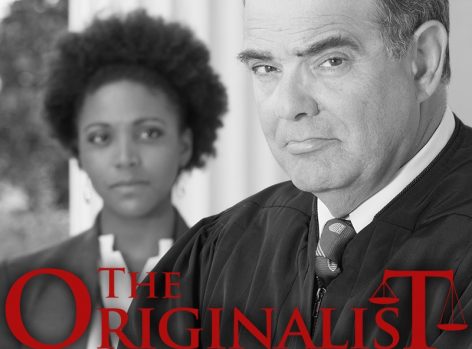
The Originalist
When a bright, liberal law school graduate embarks on a nerve-wracking clerkship with Justice Antonin Scalia, she discovers him to be both an infuriating sparring partner and an unexpected mentor. As the country waits for Scalia’s seat to be filled, The Originalist looks into the complexities of one of the most polarizing Supreme Court Justices of all times. This powerful work portrays the passionate people risking heart and soul to defend their interpretation of the truth, and the constitution.
Following the play at the Pasadena Playhouse, there was a facilitated dialogue on these relevant issues - Professor Jody David Armour (USC Gould), David Bridel (Dean, USC School of Dramatic Arts), and Jack Knott (Dean, USC Sol Price School of Public Policy) participated.
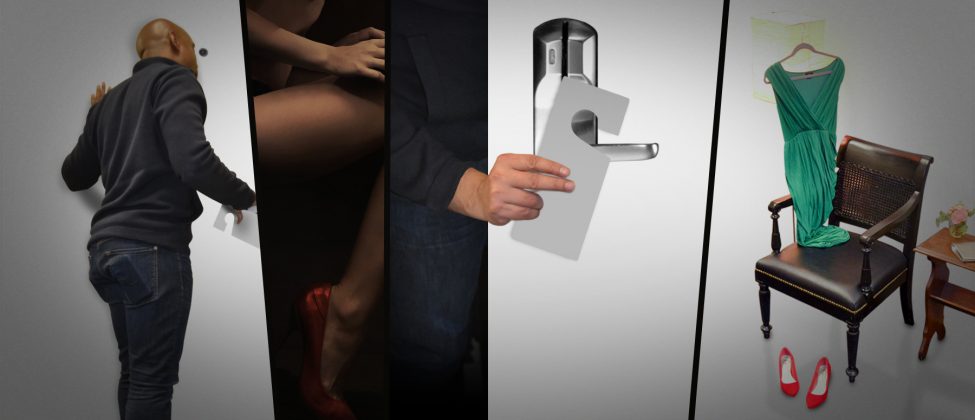
The Hotel Play
Presented by USC Visions & Voices at the USC Radisson Hotel
On April 29, 1992, Los Angeles erupted into chaos and violence after four white police officers were acquitted in the beating of African American Rodney King. The Hotel Play asks what, if anything, has changed in the past 25 years. In this unconventional theatrical work, a group of friends whose high-school graduation was interrupted by the civil unrest in 1992 gather to celebrate their 25th high-school reunion at a hotel in South L.A. There, they must confront the consequences of actions taken in their youth, revisiting sources of trauma, uncovering secrets, and discovering relationships. Set in hotel rooms and a banquet hall, The Hotel Play provides an immersive experience for audience members who travel from room to room with the characters on a journey out of turmoil and toward collective convergence.
Following the performance, USC architecture professor Amy Murphy led a discussion about the politics of neighborhoods, the tension between public and private spaces, how place and race intersect, and how The Hotel Play simultaneously remembers where L.A. was in 1992 and dares to hope about where it ought to be.
The Hotel Play was commissioned by Center Theatre Group and Playwrights’ Arena to mark the 25th anniversary of Playwrights’ Arena, a theatre dedicated to exploring the diverse voices of Los Angeles. Conceived by Playwrights’ Arena’s artistic director, Jon Lawrence Rivera, The Hotel Play was written by seven female Los Angeles playwrights associated with USC: Paula Cizmar, an associate professor in the School of Dramatic Arts; Velina Hasu Houston, director of the MFA program in Dramatic Writing; Jennifer Maisel, adjunct faculty at the School of Dramatic Arts; Nahal Navidar, MFA 2014; Julie Taiwo Oni, MFA 2009; Janine Salinas Schoenberg, MFA 2007; and Laurie Woolery.
Following the performance, Professors David Sloane and Jody David Armour participated in a discussion of the central question: are things better than they were 25 years ago.
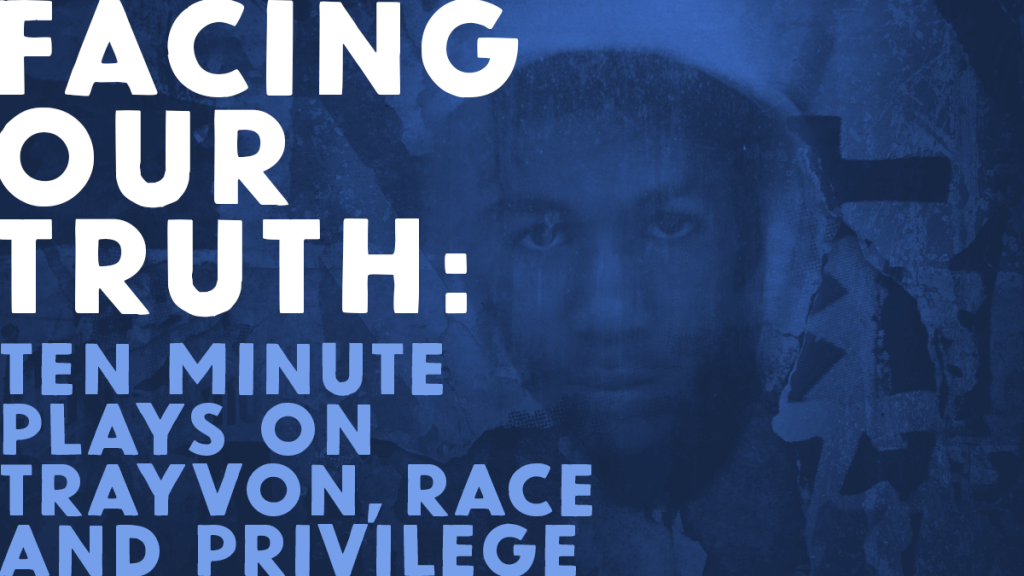
Facing Our Truth: Ten Minute Plays about Trayvon, Race, & Priviledge
In light of the George Zimmerman verdict, The New Black Fest commissioned six very playwrights to write six 10-minute plays on the topic of Trayvon Martin, race and/or privilege. The purpose of "Facing Our Truth" is to incite serious discussion in our collective communities around these urgent issues.
Following the play there was a vibrant dialogue on these relevant issues - facilitated by USC Price Professor LaVonna Blair Lewis.
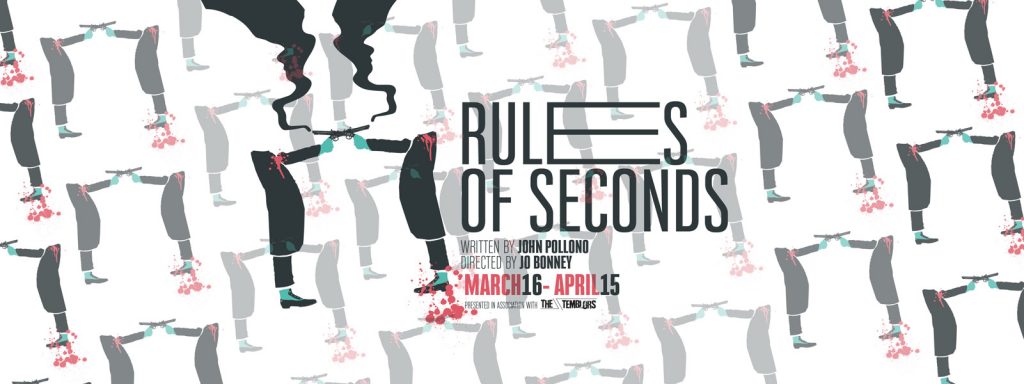
Rules of Seconds
Presented by The Latino Theater Company at the Los Angeles Theatre Center.
Set in 1855 Boston, where the slightest infraction between gentlemen is grounds for a challenge to be resolved with pistols, RULES OF SECONDS marks the inaugural production of The Temblors, the Latino Theater Company’s new collective of LA-based playwrights. When Nathaniel “Wings” Leeds is challenged to a duel by the most dangerous man in the city, he asks his estranged brother to be his second. Deep family tensions and old rivalries resurface as the brothers struggle to follow the hundreds-years-old “Code of Dueling.”

Twilight: Los Angeles, 1992
We teamed up with the USC School of Social Work Office of Global and Community Initiatives for a viewing of Twilight: Los Angeles, 1992. This work of documentary theater weaves a portrait of real individuals who experienced the violent aftermath of the 1992 Rodney King trial. “The piece explores the social, economic and political lines that divide not only a city, but a nation.” Written as a one-woman play by Anna Deavere Smith, students at the USC School of Dramatic arts adapted it for the repertory theater, in a stunning portrayal of race and ethnicity in Los Angeles post 1992.

Real Women Have Curves
Real Women Have Curves, a stage play by LA playwrite Josefina Lopez, set in a tiny sewing factory in East Los Angeles circa 1987. It's a play marked by the issues of gender politics and the Latina immigrant experience. Join us for the show and a discussion of timely issues around gender, immigration, pay equity and community.
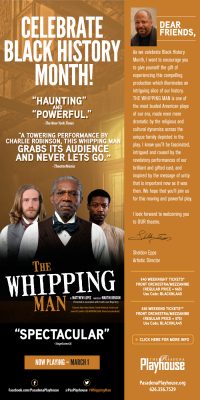
The Whipping Man
Our inaugural event was an opportunity to lead a post-show discussion at the historic Pasadena Playhouse after a performance of The Whipping Man, by Matthew Lopez.
Set during Passover, April, 1865. Throughout the South, soldiers are returning home as newly emancipated people are trying to find new roles in a changing world. Confederate soldier, Caleb DeLeon returns home wounded. He finds a home abandoned with the exception of two former enslaved people. All must come to terms with the new reality of post war lives.

